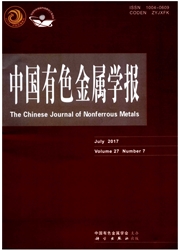

 中文摘要:
中文摘要:
利用透射电子显微镜(TEM)研究Super304H奥氏体热强钢在650℃下不同时间(10~10000 h)时效过程中3种析出相的析出行为,并对其强化机理进行分析;同时,利用三维原子探针(3DAP)研究Super304H不锈钢在650℃时效1 h后富Cu相的早期析出行为。并详细分析富Cu相共格应变的强化机制。结果表明:细小弥散的富Cu相均匀且高度稳定地分布在奥氏体基体上,当650℃时效时间达到10000 h,球形的富Cu相依然保持在纳米级别,直径约为32 nm。在时效过程中,富Cu相与奥氏体基体始终保持完全共格的关系。Super304H不锈钢显微硬度的显著提高是由于细小弥散的富Cu相起到共格应变强化的作用,晶内较大尺寸的MX相也能够通过钉扎位错起到一定的强化作用;晶界上呈链状分布的M23C6相亦具有辅助强化作用。
 英文摘要:
英文摘要:
The precipitation behavior of three precipitate phases in Super304H austenitic heat-resistant steel during long time aging (10-10000 h) at 650 ℃ was investigated by transmission electron microscopy (TEM), and the relevant strengthening mechanism was analyzed. Three dimensional atom probe (3DAP) was used to study the early stage of precipitation behavior of Cu-rich phase of Super304H aged at 650 ℃ for 1 h after solution treatment at high temperature. The coherency strain strengthening mechanism of Cu-rich phase has been investigated in detail. The results show that the dispersed fine Cu-rich precipitates exhibit spherical morphology and keep highly stable in austenite matrix, which have the size of about 32 nm in diameter, even after aging at 650 ℃ for 10000 h. The coherent relationship between Cu-rich phase and matrix is preserved during the whole aging process. Due to the coherency strain strengthening effect of Cu-rich phase, the microhardness of Super304H steel increases significantly; simultaneously, the MX phase can also pin the dislocations to induce the additional strengthening effect. Moreover, the chain-like M 23 C 6 phase precipitated at grain boundaries can also contribute to the strengthening effect for Super304H steel.
 同期刊论文项目
同期刊论文项目
 同项目期刊论文
同项目期刊论文
 The effect of nanostructural hierarchy on the mechanical properties of aluminium alloys during defor
The effect of nanostructural hierarchy on the mechanical properties of aluminium alloys during defor First principles study of Al and Ni segregation to the alpha-Fe/Cu (100) coherent interface and thei
First principles study of Al and Ni segregation to the alpha-Fe/Cu (100) coherent interface and thei Theoretical prediction of mechanical stability of ferromagnetic FCC Fe-Cu alloys from first principl
Theoretical prediction of mechanical stability of ferromagnetic FCC Fe-Cu alloys from first principl Molecular Dynamics Study of the Response of Nanostructured Al/Ni Clad Particles System under Thermal
Molecular Dynamics Study of the Response of Nanostructured Al/Ni Clad Particles System under Thermal The precipitation strengthening behavior of Cu-rich phase in Nb contained advanced Fe-Cr-Ni type aus
The precipitation strengthening behavior of Cu-rich phase in Nb contained advanced Fe-Cr-Ni type aus Structure and elastic property of nanosized complex oxide particles in ferritic/martensitic alloy: A
Structure and elastic property of nanosized complex oxide particles in ferritic/martensitic alloy: A The water effect on the structural, electronic and photocatalytic properties of graphitic carbon nit
The water effect on the structural, electronic and photocatalytic properties of graphitic carbon nit Density functional theory study of the influence of Ti and V partitioning to cementite in ferritic s
Density functional theory study of the influence of Ti and V partitioning to cementite in ferritic s 3D atom probe characterization of temporal evolution of precipitates in aging Nb-V micro-alloyed ste
3D atom probe characterization of temporal evolution of precipitates in aging Nb-V micro-alloyed ste Compositional and structural characterization of alloyed carbide by 3D atom probe and high-resolutio
Compositional and structural characterization of alloyed carbide by 3D atom probe and high-resolutio Effects of deuterium implantation and subsequent electron irradiation on the microstructure of Fe-10
Effects of deuterium implantation and subsequent electron irradiation on the microstructure of Fe-10 An investigation on precipitation behaviour of Cu-rich phase in Super304H heat-resistant steel by th
An investigation on precipitation behaviour of Cu-rich phase in Super304H heat-resistant steel by th Effects of carbide precipitate on the mechanical properties and irradiation behavior of the low acti
Effects of carbide precipitate on the mechanical properties and irradiation behavior of the low acti Strengthening effect of Cu-rich phase precipitation in 18Cr9Ni3CuNbN austenitic heat-resisting steel
Strengthening effect of Cu-rich phase precipitation in 18Cr9Ni3CuNbN austenitic heat-resisting steel Comparative Study on Austenite Decomposition and Copper Precipitation during Continuously Cooling Tr
Comparative Study on Austenite Decomposition and Copper Precipitation during Continuously Cooling Tr 期刊信息
期刊信息
